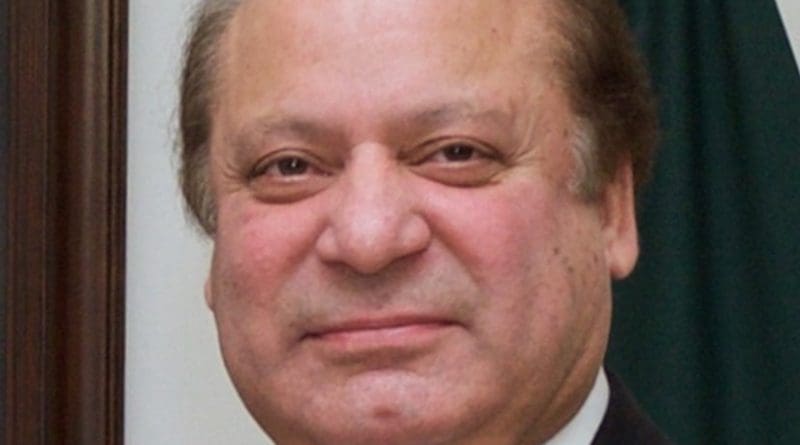Modi And Sharif Meet In Paris: Signs Of Return To Table? – Analysis
By SAAG
By Bhaskar Roy
The “unstructured” structured 160 seconds meeting between Prime Minister Narendra Modi and Pakistani Prime Minister Nawaz Sharif (Nov.30) on the side lines of the Climate Change Meeting (COP21) in Paris may have kindled some hope in both countries for resumption of dialogue in this tension ridden relationship.
The two prime ministers certainly did not discuss the weather. But they certainly did touch on the climate between the two countries. While the Indian Ministry of External Affairs (MEA) spokesman did not go beyond saying that the two leaders only exchanged courtesies, Mr. Sharif gave a glimpse into the brief conversation. Mr Sharif commented to reporters after the brief meeting that the talks “were good”, and “doors of dialogue should open”. Mr. Sharif is also reported to have told Mr. Modi that, “we have lots of concerns in Pakistan about terrorist activities and that we need to talk about it”, according to Pakistan’s leading daily Dawn.
Dawn also quotes a Pakistani official present at the meeting that, “for optics, it looked like PM Modi was more keen on talking and since he was the one who approached our PM, then may be the India-Pak dialogue might just get back on track, given the recent halt in talks”.
Optics was important for both sides but for Pakistan, it was more important. Mr. Sharif had to show his people, especially the hardliners that he had not buckled. Mr. Modi did walk up to Nawaz Sharif who was sitting in the hall, by himself, not in conversation with other leaders mingling there. He was waiting for Mr. Modi. Almost all Pakistani newspapers have carried the report that the Indian Prime Minister walked up to Mr. Sharif.
For the Indian side, this was not much of a concession to make. If the gesture massaged Pakistan’s ego, so be it. Everybody is happy, as it should be. After the failure to work on the Ufa declaration between the two sides, bilateral relations took a sharp dip, and the borders heated up. This did not help either side. In India, there was some criticism of the government’s approach to the dismantling of the Ufa declaration by opposing the Pakistani National Security Advisor’s delegation meeting the Kashmiri Hurriyat Conference leaders before the NSA delegations meet in New Delhi. But Pakistan was also severely criticised for demanding a meeting on the Kashmir issue. Simultaneously in contravention of the Ufa declaration where “Kashmir” had no mention, Pakistan insisted on bringing Kashmir to the table. On the other hand, the Pak military held Mr. Sharif and his NSA Mr. Sartaj Aziz’s feet to the fire for this concession to India.
Of course, this “accidental” meeting between the two leaders was not an accident but arranged. It had to be done this way to ensure that critics in both the countries did not jump into the ring and queer the pitch in advance.
India should consider positively Pakistan’s invitation to Foreign Minister Ms. Sushma Swaraj to attend a multilateral meeting on Afghanistan in Islamabad. If she does not, it would not be a wise move. If she does, she will have an opportunity to discuss important bilateral issues on the side lines. It will also be an extension of the Paris meeting since most of the work will have to be done at levels below PMs. Will these help remove the post-Ufa freeze? It will take some time, but the block has to be lifted with some urgency.
It goes without saying that there would have been some quiet American “advice” to bring about the Paris meeting. PM Sharif’s Washington official visit and meeting President Barack Obama and other senior officials of the US administration made a beginning. Mr. Sharif would have certainly briefed Army Chief Raheel Sharif (no relation of Nawaz Sharif) on his return from the US. Next was Gen. Sharif’s self-invited visit to the US. He was roundly lectured by his American interlocutors, demanding a pull back on support to groups like Haqqani network, the Afghan Taliban as well as the LET.
The Pak military is the country’s power centre, and will remain so for a long time unless the political leaders close ranks and desist from using the military in their political fights. The people of Pakistan do prefer interference by the forces in the interest of stability because the politicians have disgraced themselves. But the army also has to heed the Americans because they remain the biggest arbitrators and aid giver.
China’s encouragement to Pakistan to break the ice with India cannot be ruled out either. It is not in China’s interest either to have an India-Pak military flare up where Pakistan’s use of tactical nuclear weapons is increasingly becoming a possibility. Pakistan’s foreign secretary recently confirmed that they have deployed tactical nuclear weapons on the Indian front against a possible Indian conventional attack. Pakistan’s apprehension is that if another terrorist attack like the Mumbai “26/11” takes place, India may not hold back.
To restart meaningful talks between the two countries, Pakistan has to take some steps. To start with, the main perpetrator of the “26/11”, Zakiur Rehman Lakhvi should be rearrested. The case must be restarted in the Pakistani court earnestly and without prejudice. The evidence in the case provided by India to Pakistan was not “Literature”, but hard evidence. The onus rests on Gen. Raheel Sharif.
*The writer is a New Delhi based strategic analyst. He can be reached at e-mail [email protected]

